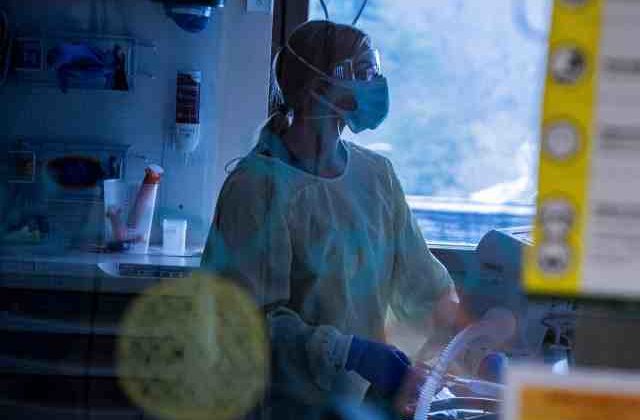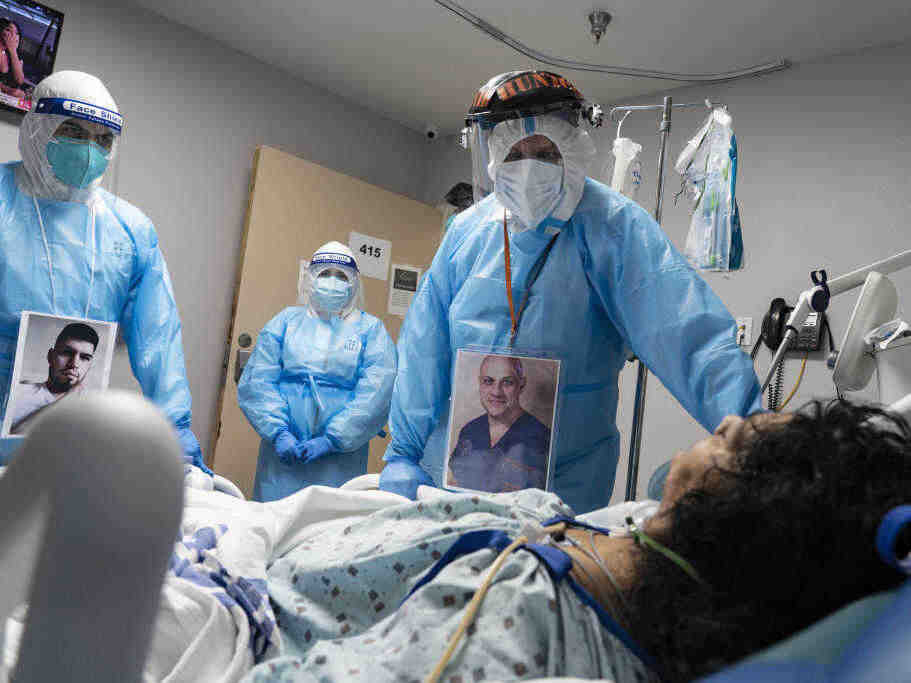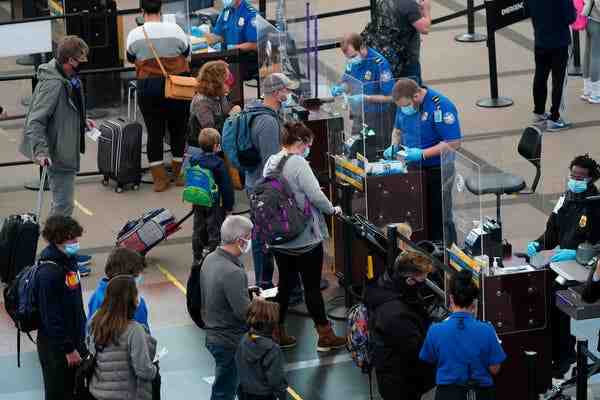
San Diego County reported a total of 5,976 new coronavirus cases on Thursday, setting a new daily record, according to the county.
The previous one-day record was set on January 7, when the district’s health department reported 4,550 new cases.
The fact that the previous record was exceeded by almost 1,500 cases on the eve of New Year’s Eve has clearly unsettled those responsible for the protection of public health.
Dr. Cameron Kaiser, the deputy health officer for San Diego, said in a statement released Thursday afternoon to cut plans for the ushering in the new year.
“San Diegans must continue to make decisions to protect themselves and others,” said Cameron. “When you celebrate New Year’s Eve, limit it to the people who live with you and make sure everyone is using strategies that we know will work.”
With local bars, clubs and restaurants open on December 31st with no capacity limits, it was obvious that the advice was not being heeded. As evidenced by a steady stream of Twitter announcements, many companies are promoting New Year celebrations, including the Pacific Beach Bar Crawl, which will take revelers to six different locations.
Aside from a last-minute government decree that will turn things off once 2022 arrives, there will be parties and the virus is sure to spread quickly. Dr. Davey Smith, chief executive of Disease Research at UC San Diego, said that young and healthy people are at lower risk of developing serious illness because Omicron causes milder symptoms.
However, with the latest version of the virus spreading so easily, it will be easier than ever to get caught in the crosshairs for the really at risk, those or the elderly, and anyone with a serious illness other than COVID-19.
“Downstream planning really has to be a big part of that vacation,” said Smith. “Don’t just think about who is going to the party, but also who you are going to visit and who you really shouldn’t be going to afterwards.”
After deciding to spend the New Year with his parents in a cabin away from confetti and dance floors, he said he had already heard too many stories from younger, healthier people that he seriously regrets.
“I’ve heard too many heartbreaking stories: ‘I had a runny nose, I went to see my grandma, I thought I was going to be fine,'” said Smith. “You’re fine, but grandma or grandpa get sick and then they die.”
“It’s heartbreaking because they end up realizing they got it inside.”
Although the number of COVID-19-related hospital admissions is nowhere near as high as it was during the vacation wave last winter, mainly because a high vaccination rate makes severe symptoms much less likely, the numbers are still rising, especially among the unvaccinated.
Scripps Health chief executive officer Chris Van Gorder said Thursday that an additional 22 people across the medical provider’s network were hospitalized on Wednesday. Test positivity rates, he said, had hit 31 percent, with 145 now in Scripps beds. Thirty-one of them, he added, were 50 years old or under, 24 of them in their 20s, 30s, and 40s.
As has been the case for months, the unvaccinated are feeling more and more serious consequences.
“We currently only have 5 percent of our hospital patients who have been fully vaccinated – that is, with the required injections plus a booster,” said Van Gorder.
All medical staff, he said, were preparing for a very tough start to the year. Even if the percentage of infected people is likely to be significantly lower than with the Delta variant, the sheer number of cases generated by this holiday is likely to marginalize the health system and keep it there.
“The effects will be felt throughout January and possibly well into February as we haven’t seen the effects of the Christmas and New Years events and are more indoors due to the colder and wetter weather,” said Van Gorder.
Can I get COVID-19 from touching the front of my face mask?

If you touch the front of your mask, you can get infected yourself. Do not touch the front of your mask while wearing it. After taking your mask off, it is still not safe to touch the front. After washing the mask in a regular washing machine, it is safe to wear the mask again.
How do you hand wash a face mask? • Wash your mask with tap water and detergent or soap. • Rinse the mask thoroughly with clean water to remove detergent or soap.
Can you touch your face when wearing a face mask?
It’s only natural that when you wear a mask or face covering you want to want to touch your face more because it feels strange or strange to you. “Whatever you do, don’t try,” Dr. Hamilton says. “If you need to adjust them, wash your hands thoroughly before and after you touch them.” If you need to take your mask off for a short period of time, fold it so the outside is inward and against you, says Dr. Hamilton. This prevents the inner surface from coming into contact with the outer surface during storage.
Does COVID-19 have an effect on your skin?
Skin diseases caused by SARS-CoV-2 are increasing worldwide. These diseases typically fall into five different patterns, including maculopapular rash, vesicular rash, pseudofrost, livedo, or necrosis and urticaria. A red rash and urticaria are considered to be the most common manifestations of COVID-19.
What should you do if you accidentally touched your mask?
Do not touch your mask while wearing it. If you accidentally touch your mask, wash or disinfect your hands.
What should you do if you accidentally touched your mask?
Do not touch your mask while wearing it. If you accidentally touch your mask, wash or disinfect your hands.
Can we reuse disposable surgical masks during COVID-19?
The CDC does not recommend reusing single-use surgical masks that are intended to be used only once. The FDA recognizes that there may be public health concerns about the availability of surgical masks during the COVID-19 emergency, but strategies exist to preserve surgical masks.
Is it possible to pick up COVID-19 by touching an infected surface?
It is possible for a person to contract COVID-19 by touching a surface or object that has the virus on and then touching their own mouth, nose, or possibly their eyes. This is not believed to be the main route of the virus, but we are still learning more about this virus.
What does a negative COVID-19 virus test result mean if you have symptoms of COVID-19?

If you test negative for the virus that is causing COVID-19, the virus has not been detected • If you have symptoms of COVID-19: – You may have received a false negative test result and you may still have COVID-19. You should isolate yourself from others. – Consult your doctor about your symptoms, especially if they worsen, about follow-up exams, and how long you have been in isolation.
What could be causing a false negative COVID-19 antibody test result? An antibody test too early can lead to false negative results. This is because after an infection, your immune system takes a week or two to produce antibodies.
Does a negative result for COVID-19 test mean I don’t have the virus?
You can test negative for COVID-19 and have it anyway. A nose swab test is just a snapshot. In other words, if you get a negative COVID-19 test result today, it does not mean that you definitely do not have the virus, but rather that not enough viruses have been collected at the time of your test to register as positive.
Does a negative result rule out the possibility of COVID-19?
A negative result does not rule out COVID-19 and should not be used as the sole basis for treatment or patient management decisions. A negative result does not rule out the possibility of COVID-19.
What does a positive COVID-19 antibody test result mean?
A positive result means that the test detected antibodies to the virus that is causing COVID-19, and it is possible that you have had a recent or previous COVID-19 infection and developed an adaptive immune response to the virus.
Can a person test negative and later test positive for COVID-19?
When using the diagnostic test developed by CDC, a negative result means that the virus that causes COVID-19 was not found in the person’s sample. In the early stages of infection, it is possible that the virus will not be recognized.
What are consequences of a false negative COVID-19 test?
The risks of a false negative test result for a patient include: delayed or lack of supportive treatment, failure to monitor infected individuals and their household or other close contacts for symptoms that lead to an increased risk of spreading COVID-19 in the community, or others unintended adverse events.
How long can you test positive for COVID-19?
> People who have recovered from COVID-19 can continue to test positive for up to 3 months after being infected.
Are those with diabetes at higher risk of serious COVID-19 illness?

Early studies showed that around 25% of people who went to hospital with severe COVID-19 infections had diabetes. People with diabetes were more likely to have severe complications and die from the virus.
Is it safe for people at high risk of developing serious illness from COVID-19 to care for a COVID-19 patient? If possible, the caregiver should not be someone who is at higher risk of developing serious illness from COVID-19.
Does sugar consumption affect the spread of COVID-19?
Sugar consumption in particular has been shown to affect COVID-19 mortality by contributing to the chronic inflammatory state. Restricting the intake of free sugar has a measurable impact on disease-predicting physiological parameters in just 9 days.
What is a healthy diet during the COVID-19 pandemic?
â € œEat a mix of whole grains like wheat, corn and rice, legumes like lentils and beans, plenty of fresh fruits and vegetables, with some foods from animal sources (e.g. meat, fish, eggs and milk) every day. â € ¢ Choose Whole grains like unprocessed corn, millet, oats, wheat, and brown rice whenever possible; They are rich in valuable fiber and can help you feel full longer. Choose raw vegetables, fresh fruits and unsalted nuts as snacks.
How to limit sugar intake during the COVID-19 quarantine?
The WHO recommends that ideally less than 5% of total energy intake by adults should come from free sugar (around 6 teaspoons). If you fancy something sweet, fresh fruit should always be in the foreground. Frozen fruits, canned fruits in juice instead of syrup, and dried fruits with no added sugar are also good options.
Can I get the COVID-19 vaccine if I have an underlying condition?
People with underlying diseases can get a COVID-19 vaccine as long as they haven’t had an immediate or severe allergic reaction to a COVID-19 vaccine or any of the ingredients in the vaccine. Learn more about vaccination considerations for people with pre-existing conditions. Vaccination is an important consideration for adults of all ages with certain underlying medical conditions as they are at an increased risk of developing serious illnesses from COVID-19.
Who is not eligible for the COVID-19 vaccine?
Children under the age of 5 are currently not eligible for the Pfizer-BioNTech COVID-19 vaccine unless they are part of a clinical trial. Children and adolescents under the age of 18 are currently not eligible to receive the Moderna or Janssen COVID-19 vaccines.
Who should not take the Pfizer-BioNTech COVID-19 vaccine?
If you have had a severe allergic reaction to any ingredient in the Pfizer-BioNTech COVID-19 vaccine (such as polyethylene glycol) you should not receive this vaccine. If you have had a severe allergic reaction after a dose of the Pfizer-BioNTech COVID-19 vaccine, you should not receive another dose of any mRNA vaccine.
